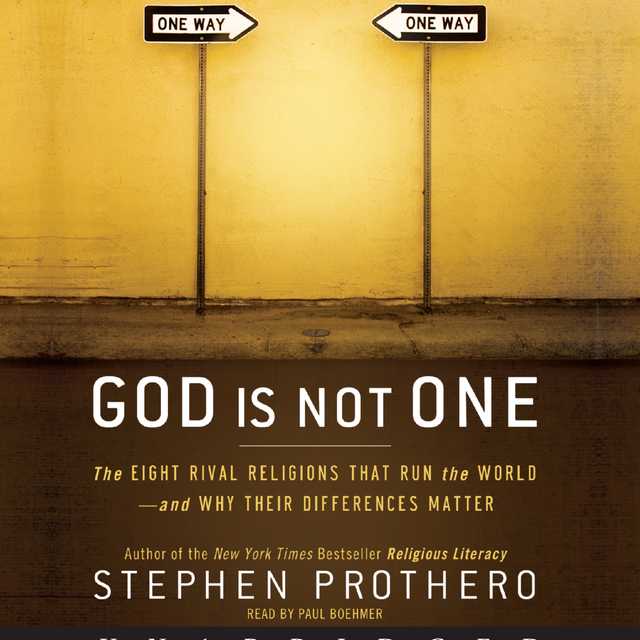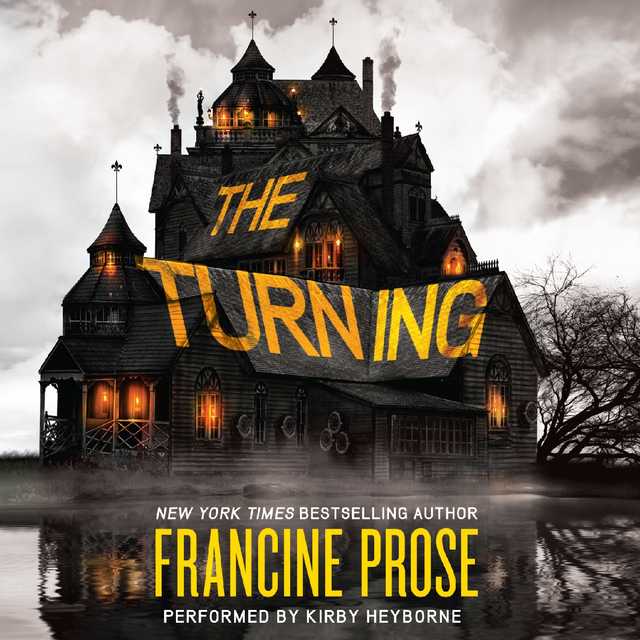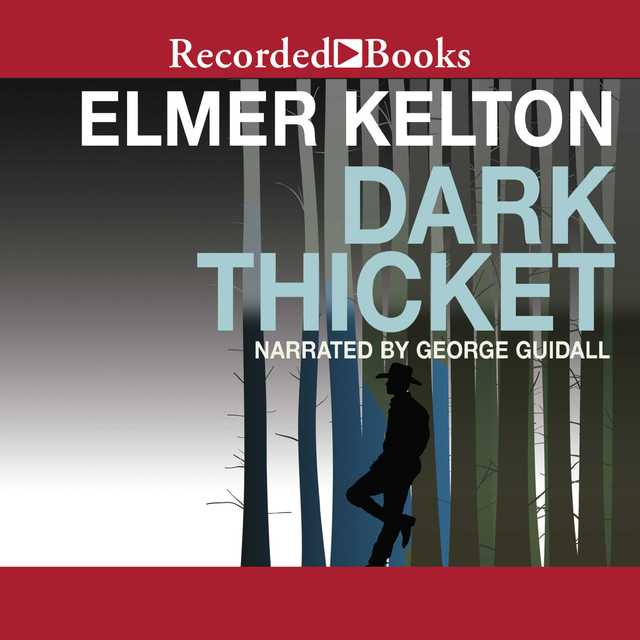God Is Not One Audiobook Summary
In God is Not One: The Eight Rival Religions That Run the World, New York Times bestselling author of Religious Literacy and religion scholar Stephen Prothero argues that persistent attempts to portray all religions as different paths to the same God overlook the distinct problem that each tradition seeks to solve. Delving into the different problems and solutions that Islam, Christianity, Buddhism, Judaism, Confucianism, Yoruba Religion, Daoism and Atheism strive to combat, God is Not One is an indispensable guide to the questions human beings have asked for millennia–and to the disparate paths we are taking to answer them today. Readers of Huston Smith and Karen Armstrong will find much to ponder in God is Not One.
Other Top Audiobooks
God Is Not One Audiobook Narrator
Paul Boehmer is the narrator of God Is Not One audiobook that was written by Stephen Prothero
Stephen Prothero is the New York Times bestselling author of Religious Literacy and God Is Not One and a professor of religion at Boston University. His work has been featured on the cover of TIME magazine, The Oprah Winfrey Show, The Daily Show with Jon Stewart, The Colbert Report, NPR, and other top national media outlets. He writes and reviews for the New York Times, The Wall Street Journal, Boston Globe, The Washington Post, USA Today, Los Angeles Times, Salon, Slate, and other publications. Visit the author at www.stephenprothero.com or follow his tweets @sprothero.
About the Author(s) of God Is Not One
Stephen Prothero is the author of God Is Not One
More From the Same
- Publisher : HarperAudio
- Abraham
- American Gods [TV Tie-In]
- Dead Ringer
- House of Sand and Fog
- Prey
God Is Not One Full Details
| Narrator | Paul Boehmer |
| Length | 14 hours 38 minutes |
| Author | Stephen Prothero |
| Publisher | HarperAudio |
| Release date | April 20, 2010 |
| ISBN | 9780061988677 |
Additional info
The publisher of the God Is Not One is HarperAudio. The imprint is HarperAudio. It is supplied by HarperAudio. The ISBN-13 is 9780061988677.
Global Availability
This book is only available in the United States.
Goodreads Reviews
Lydia
February 29, 2012
After reading Stephen Prothero’s “God Is Not One” I have a deeper and less judgmental understanding of religious differences and the religious experience. I feel we are all on a journey in this life to find a perfect love and we find it in different ways: through the love of God, or Allah; through meditation and the love of self; through the love of a mate, parent, sibling, or child. Regardless of where this perfect love is found, once you find it, you realize that life is something incredible and special and you want to nurture it and share your experience with the world around you.I have been hypercritical of religion in the past, but it’s not the practice that has ever rubbed me the wrong way, always the practitioner. I am inclined to believe that some people understand love and how to express it through religion, while others have merely found a façade from which to exercise their hate by constantly focusing on being mean to others, finger-pointing and tirelessly professing to know their god’s mind and what is evil and must be destroyed. These people are still on their journey, and maybe religion hasn’t helped them discover and feel a perfect love, but we can’t forget that we are all searching for it, and that alone warrants a level of compassion and understanding, even if we don’t agree with the way in which they exercise their ignorance.I’m so glad I got around to finally reading this! I heard about it on NPR news a few years ago (at least), and I like that Prothero doesn’t try to say that all religions have the same goal in mind. He rightly differentiates between them by pinpointing the problem area each identifies, and then the cure. For instance, Christianity identifies the human ill as sin; the remedy is salvation. Judaism – exile from the Promised Land; return from exile. Islam – self-sufficieny; submission. Buddhism – suffering; nirvana. Atheism – religion; self-sufficieny. And on and on. (My quick and loose interpretation, at best, which doesn’t even address the different types of these religions or the many other very different religions with varying goals.)It’s a wonderful read. Prothero states quite smartly in the introduction:"… The ideal of religious tolerance has morphed into the straightjacket of religious agreement.Yet we know in our bones that the world’s religions are different from one another. As my colleague Adam Seligman has argued, the notion of religious tolerance assumes differences, since there is no need to tolerate a religion that is essentially the same as your own. We pretend these differences are trivial because it makes us feel safer, or more moral. But pretending that the world’s religions are the same does not make our world safer. Like all forms of ignorance, it makes our world more dangerous. What we need on this furiously religious planet is a realistic view of where religious rivals clash and where they can cooperate. Approaching this volatile topic from this angle may be scary. But the world is what it is. And both tolerance and respect are empty virtues until we actually know something about whomever it is we are supposed to be tolerating or respecting."I highly recommend this book if you want to know the basics of Islam, Christianity, Confucianism, Hinduism, Buddhism, Yoruba Religion, Judaism, Daoism and Atheism (which at times, depending on community and practice, can resemble religion).
Sarah
August 13, 2012
Having abandoned this book to gather dust on my ‘to-read’ shelf for over six months, I’m now a bit upset with myself at not having read it sooner. I am no stranger to Dawkins-esque New Atheism, which Mr. Prothero (not unjustly) describes as “angry” and “self-righteous.” After reading through an endless (and repetitive) collection of New Atheist books, though, I felt utterly drained of anger and in dire need of a long religious study hiatus.Six months and a few epic novels later, I find myself closing the cover of one of the most reasonable and informative books about religion that I’ve ever read. Positing a new approach to the societal conversation about religion, Prothero warns his readers against the dualistic style of argumentation we’ve espoused for so long (i.e. religion is all good vs. religion is all bad). Instead, he urges his audience to consider a more objective strategy and offers detailed information (never a bad thing, in my opinion!) about the world’s most influential religions, highlighting the differences that make them each unique.In the wake of a brutal and unyielding literary (and virtual) war about religion, Mr. Prothero offers a breath of fresh, neutral, adequately informed air. God Is Not One outlines the basics of the world’s major religions and crafts a solid foundation for a more humane and informed approach to discussing this delicate subject.
Al
July 28, 2010
This is an interesting take on comparative religions which introduces the reader into eight 'great religions', in order: Islam, Christianity, Confucianism, Hinduism, Buddhism, Yoruba, Judaism and Daoism. By 'great' the author means those which he considers most influential in the modern world. Sometimes this also means those with the largest numbers, but this is not necessarily always the case. Prothero himself admits much is missing from his choices — some examples: Shinto, Jainism, Zoroastrianism, Wicca, Baha'i, Sikhism, and even such new movements as Rastafarianism and Scientology.Prothero writes in a friendly, easy-to-read way and speaks eloquently of each of his chosen religions. Part of the fun is that as each of these is described, one is sorely tempted to become like Woody Allen's Zelig and literally transform oneself into each of them. This works in two ways: first, by concentrating on how each religion goes to resolve the problems it sees for humanity and its role in the world; and secondly by making many cross-references between all eight where they seem to complement if not echo one another. The latter, however, is not to be taken as meaning that the author sees them as all the same underneath. Indeed, the main thrust of the work is to argue against codifying them as such. Prothero argues that each religion presents its own unique and different approach. As the title of the book suggests, each religion shows a different path to different gods, and that these differences are significant.The chapter titles provide a simplified, usually one-worded description of these ways: Submission (Islam); Salvation (Christianity); Propriety (Confucianism); Devotion (Hinduism); Awakening (Buddhism); Connection (Yoruba); Exile and Return (Judaism); and Flourishing (Daoism). In the process, 'religion' becomes redefined more as representing a way of life, a way of living one's life, which is reflected in the rich diversity of interpretations each religion provides. It is interesting that this also implies that one does not even need to believe in the actual existence of a god or gods for each specified pathway to influence the way you live your life.And here, perhaps, is the problem. The existence of a vast, complex variety of religious experiences and influences is an obvious aspect of humanity. But the redefinition of religion in this way makes the author argue that Atheism is also a religion. He includes what he calls a brief coda on Atheism (aka the Way of Reason) but only to speak of it pejoratively — basically because some Atheists call for the abolition of all religions — and Prothero finds religions far too interesting in themselves. He sees them as humanity's ways of being human, even though he does seem to acknowledge that some see the great religions as having the task of transporting and transforming us, essentially because they seem to argue that the world is not our home, and that being human is not our true calling. (An Atheist would argue the opposite: the world is our home, and being human is our true calling.)While acknowledging the real diversity of religions, Prothero still argues that if there is one thing shared across his great religions it is a humbling belief that, if there really is a god or goddess worthy of the name, He, She or It must surely know more than we do about the things that mater most. I'm not sure where that places Prothers on the question of whether god exist or not, but given the fact that everything that we 'know' about these 'gods' has been created by men and written down by men, nothing in this work is a very convincing argument for their actual existence at all.
Glen
November 24, 2014
A few weeks ago I read an interview with the author of this book and that intrigued me enough to make this the first purchase through Apple's iBooks application on my iPhone. During this last weekend's dive trip, and I had enough free time to spend educating (and re-educating) myself on the world's greatest religions. Prothero is a religious studies professor, and this book comes across as a basic college 101 survey course, albeit one that does have a thesis: that it is a mistake for people to claim that all religions are basically the same. Through chapters on Islam, Christianity, Hinduism, Yoruba, Buddhism, Judaism, Confucianism, and Daoism, Prothero challenges you to question your perceptions of what you think religion is, what people want from it and what they believe that get from it, and how that works in a world where any two people who meet on the street will very likely have incredibly different viewpoints, even if they grew up in the same time and same place. (I hold this truth to be self-evident, given recent experiences reconnecting to family and high school friends on Facebook.)This is no self-help book. The goal here is not to provide a menu of religions so you can choose one to feast on for the rest of your life. Instead, it's the classic college assignment of compare/contrast, and in every case Prothero does a great job of doing so, and doing so in the context of each religion. That is, he uses the terms of the religion itself when doing the contrasting, rather than always comparing with his own upbringing.Prothero does insert himself in the book, and it is better for it. It's important to know that he was raised in the Christian tradition, but also to know that he's attended Seders and has friends and colleagues in all these fields. His goal, beyond the thesis, is that by understanding the beliefs (or non-beliefs, as the case may be) of others, you are better suited to get along with them, and it certainly seems like he is a model example of this.I come away from this book with as many questions as I went in, albeit ones that are different and more nuanced, more than likely. For one, I'm not sure that it is entirely possible that all these religions can co-exist peaceably, at least not under traditions that proselytize and seek converts, or where zealots seek to modify others' behavior based on their religious convictions. In this sense I do side with the New Atheists who feel that by allowing religion to enter the public, political realm is a clear and present danger. But Prothero is spot on to point to New Atheists being as starkly fundamentalist as the worst of any of the extreme wings of any of the religions, and that's enough to give anyone pause about their statements and goals.This was the first book that I have read completely on my iPhone, and I very much enjoyed the experience. I didn't use the ability to make notes on the text outside of marking one typo, but I'm looking forward to taking advantage of that feature in the future. One time I did "lose my place" in the book, but finding where I was again was as easy as with the paper version.
Justin
October 14, 2017
God is Not One: The Eight Ancient Religions that Run the WorldThe author (a Boston U. professor) is making what is, apparently, a radical statement in modern American academia-- all religions are not the same. The goal of the book is to provide a simple summary of major religions; stating the primary problem posed and solved in each religion.He is primarily mindful of New Atheists who label all religionss as equally harmful, but also is concerned about those advocating simple solutions to religious-based conflicts who ignore the irreconcilable differences between religions. He criticizes ideas of religious unity as a "rabbit hole." Religion "matters" because it moves cultures, voting, economies (see Mecca tourism), art, charity, justice, and wars. He would also critique evangelists in these religious who do not recognize the drastically different world views. While all religions inquire about the human condition, they don't ask the same questions. Evangelical Christians, for example, may think salvation is the goal of each religion and have a hard time understanding that Confucianism and Buddhism do not believe in sin or have an idea of salvation. All religions converge in their ethics but diverge in their theology. Religion is a force for "good and evil", nevermind that these terms are problematic when approached from worldviews that don't necessarily hold to a concept of good and evil.I've only really studied two religions in-depth, so I found this book informative. I found his description of Christianity, including the fundamental problem and solution, as largely correct. Shortly after finishing this book, I learned I would be moving to the Asia-Pacific and I attended a course presenting the anthropology and political economy of SE Asia; this book provided some helpful filler material on Confucianism, Buddhism, Brahmans, and Muslims and gave me some questions to ask in class. The below are a basic summary of my notes on each religion as presented in the book:Yoruba, The Way of Connection:I probably learned the most about the Yoruba religion that started in West Africa (25 million adherents) and was imported in the slave trade into the Caribbean and South America, where it syncretized with Catholicism. In Yoruba, the goal is to flourish "here and now," to get the (pantheistic) Orishas to intervene on your behalf. Yorubas adopted Saint veneration from the Catholic church and pray to the saints like they do orishas.Islam, The Way of Submission:The author begins with Islam because "the 21st century belongs to Islam." Sin is not the problem; there is no original sin in Islam. "Pride" is the problem. Individual peace, Salam, is the goal. Belief is not the way, submission is the way. Islam has much on war and the ethics of waging war, in contrast to the Christian New Testament which ignores war. Islam also does not separate the secular and sacred, there is a religious state and this cannot be forgotten when looking at various conflicts in the Islamic world. 15 percent of Islam is Shi'ia, but there are also Sufis who are also remarkable. Sufis "crave" Allah and not Islam, per se.Christianity, The Way of Salvation:The Nicean Creed begins with "we believe," and henceforth orthodox belief has been more important to Christian sects than orthopraxy. Prothero describes Christianity as the "rescue religion," and explains the central problem of original sin with how salvation is obtained through Christ alone. He describes the Gospel succinctly well. There are 2.2 billion Christians speaking 300,000 languages. The religion is increasingly "browning" as 63% of Christians are non-white (elsewhere I've seen that the median Christian is a West African female). Christians don't identify personally with doctrine much, most Christians cannot recite creeds. Prothero gives a brief overview of the history of evangelicalism with an eye to modern movements. Pentacostalism is pushing Christian growth worldwide from West Africa to unexpected places like Sweden. He includes Mormonism as an American sect (despite it being absolutely incompatible with orthodox Christianity, but where else can you put it?).Confucianism, The Way of Propriety:The yin and yang. Confucianism mixes easily with other Chinese religions. China does not officially recognize confuscionism, but it definitely influences the culture. One tenet is the idea of self-improvement through education; Confucious was a polymath. It is also about "doing the right thing, properly." Confucianism has experienced a revival in China with a rise in interest with reading the ancient works. Confucians refer to the "5 classics." But Confucianism is difficult to redeem on feminist grounds, although Prothero notes academic attempts to do just that. Apparently looking at the original writings/teachings gives evidence of looking unfavorably upon women.Hinduism, The Way of Devotion:Shiva or Ganesha. Brahma Shiva and Vishnu. There is a paradise, but no sin to be saved from. The aim of Hinduism it to create and sustain a stable social order. Prothero explains Vedic deities and polytheism. Moksha--emancipation and release-- is the end of the process of reincarnation and endless wandering, it can only be done through excessively good deeds. Brahma cannot be learned or attained through good works, it can only be experienced. There are very different schools of philosophical Hindu thought, including one that says Moksha comes from the grace of God or a spiritual being. The author walks through the histories of these schools of thought. There is a lot on goddesses, the act of sex, and a whole lot of other information.Buddhism, The Way of Awakening:Buddhism says we can solve the human problem without God. Buddhists seek to overcome suffering. There are 175 million Buddhists in China competing with the Confucianists for influence. There are four noble truths and the eightfold path. The author walks through various schools of Buddhist thought; these become popular in trends and then fade from popularity. Some are similar to other religions.Judaism, The Way of Exile and Return:It is supposedly a story and Commandments to remember. Unlike Christians, Jews don't have Creeds, councils, excommunication, etc (although the second temple history recorded in the New Testament certainly shows that they did before 70AD). Prothero examines reform schools of Judaic thought versus orthodox schools, etc.Daoism, The Way of Flourishing:Daoism is focused on the "Here and now," and also influences most Chinese in some way. It is popularized in West by the writings of Jack Keroac, Bruce Lee and martial arts, etc. It does not hope for or fear an afterlife. It's originator is Lao Tzu. It is about "reversals," letting go rather than striving. It still has a trend of seeking immortality, and there is some Daoist deity.A Brief Coda on Atheism, The Way of Reason:Atheists represent 9% of Western Europe, 1% of Americans. They evangelize with the same vigor that they criticize evangelical Christians for evangelising with. Prothero gives the same critique of New Atheists that others have rightly given, namely their rudeness, logical fallacies, and contradictions. Most alarming to the author is the "aping dogmatism." Humanist manifestors have norms, creeds, doctrines, and clearly excommunicate (particularly publicly on the internet) those who deviate. Atheists instead worship men- Darwin, Payne, Russell, etc. But they also borrow from Western ethics which are based on religion, which is a problem most New Atheists conveniently ignore.The book's conclusion:You have to acknowledge and understand the diversity of religions. Not all religions are the same good or the same danger. People are different, cultures and worldviews are different, and we deal with it because we are enriched by it. Religion also helps explain irrational behavior that economists can't describe or predict.
Chad
August 10, 2013
To begin with, the bizarre coda about atheism that many reviewers have cited as the reason for a low rating does, to be sure, leave one with a bad taste in the mouth. For all his seeming knowledge of the religions he explains, he doesn't appear to have a firm grasp on what atheism is. After carefully reading the coda, I think I can see where Prothero is coming from, but he does a poor job in writing an objective account of what atheism, represents. More on that later in the review. Anyway, yes, its tone is distasteful, and in general, I agree with the backlash against it, but minus that last chapter, I'm giving the book, on the whole, a 4-star review. Why?Well, being raised Christian, I can testify to the staggering lack of awareness in America concerning anything outside the various Christian-centric denominational bubbles. The reason Fox News pundits and far right-wingers can get away with labeling Islam as a violent terror-obsessed belief system is that most middle-Americans have never actually met a Muslim. Other, eastern, religions fare better in American awareness, but Confucianism and Hindu and Buddhism still exist in the minds of Americans as flakey New Age stereotypes as opposed to ancient traditional religious beliefs.What Prothero does, very effectively, is efficiently explain the broad-stroke details of what he calls the "Great Religions": Islam, Christianity, Confucianism, Buddhism, Yoruba, Judaism, and Daoism. Are these just superficial portraits of very complex belief systems? Absolutely, but as a primer, it works. Prothero puts each religion into historical context, tries to describe their nuances and internal conflicts, and highlights each religion's central 'problem' and its goals for solutions to that problem.Are these exhaustive explanations? Of course not, and Prothero never pretends they are. But if the average American were to read God Is Not One, they'd know volumes more afterwards than they did before. And as the author notes, this won't necessarily solve all the world's religious-based conflicts, but it would go along way toward creating more productive dialogues, where you can discuss someone else's beliefs based on what they're actually about, and not on what you've been told they're about.And what about that Atheist coda? Well, Prothero makes some valid points about the sometimes antagonistic intensity of what he calls "New Atheists". The Richard Dawkins's and Christopher Hitchens's of the world who sometimes seem out for blood when discussing their distaste for people of faith. The problem with this chapter, however, is Prothero's dismissive, almost contemptuous tone when talking about them. He is careful to include a small section about what he calls "Friendly Atheists", so I understand that he recognizes the validity of the atheist worldview. But he spends most of the chapter lambasting Sam Harris and Daniel Dennett and company, and calling them hypocrites, and claiming that if you are too vocal in your atheist beliefs, then you too are religious. Again, if I squint, I can see the point the author is trying to make. But as an atheist, I felt very strongly that Prothero was misrepresenting my beliefs, and his misrepresentations are given weight by the mostly fair-minded and thorough analyses of the rest of the book.If you'd like a quick read that gives a quick, but informative explanation of several major world religions, God Is Not One is a great book.If you'd like a quick explanation of atheism, skip this book's coda, and email me instead.
Sistermagpie
October 21, 2010
I saw the author of this book interviews on TV, wanted to read it, and promptly forgot his name and the name of the book. But I finally tracked it down--go me!God is Not One challenges an idea that's become synonymous with religious tolerance, the idea that all religions are just "the same" underneath. It's not about saying one religion is better than another, but looking at how each of the 8 most popular religions approach the problem of life and what solutions they offer. For instance, submission in Islam, salvation in Christianity, etc. The book covers Islam, Christianity, Confucianism, Hindu, Yoruba, Buddhism, Judaism and Daosim, giving an introduction and a brief history of each one. It also ends with a brief note on atheism. At first I thought it was going to just focus on the angry New Atheists like Dawkins et al., but in fact the author stands up for the quieter, often female, voices in atheism who don't believe religion or the religious are stupid, or that they are the ones who know the truth.I enjoyed reading about all of them!
Laurie
July 15, 2012
I thoroughly enjoyed this book, found it measured, respectful, fascinating, and satisfying---until I came to the chapter on atheism. There I was bitterly disappointed. Prothero spends the majority of his coverage of atheism on the "New Atheists"---Hitchens, Dawkins, et. al., with all their bombastic diatribes and argumentative ways. He shows very little effort and even less interest (or respect) for the more average atheist, the one who, to paraphrase Carl Sagan, "has not yet been convinced by the evidence."I loved the other chapters, and learned so much, especially about Daoism and Yoruba. But then he had to ruin it by declaring that atheism fit the definition of religion---please. It seemed he let the others define themselves, to a degree, but his disdain for atheism was abundantly clear.
Kiel
September 13, 2021
Well-researched book that presents a general overview of the world's eight major religions with specific examples of how they work. You are guaranteed to learn something from this book! I recommend it for anybody who is interested in culture, religion, philosophy, or just curious as to what other belief systems entail.
Edward
June 09, 2019
This is an excellent book for lining up the eight major religions (in terms of numbers and influence, the latter a more subjective assessment) and setting out their basic components. Obviously, it's not going to be a book that goes into much detail on these religions, and there are bound to be some generalities that a reader might quibble with, especially if he is a member of one of these religions. But without such a compilation who can even easily name the eight religions? Prothero lists them as Christianity, Islam, Confucianism, Hinduism, Buddhism, Yoruba religion, Judaism, and Daoism. His book is an argument against the idea that all religions are basically alike, differing only in minor details. And it's also a criticism of the so called "new atheists" who in condemning the malevolent practices of "religion", lump all beliefs and practices together. They grossly distort the many complex and cultural differences that exist among the religions of the world. That is not to say, though, that these many religions are always exclusive of one another. Their beliefs and practices often overlap in odd ways. Many examples could be given, but one that caught my attention had to do with Hinduis. Hindu temples and scriptures are miles away from the transcendental God of Judaism, Christianity, and Islam, those three religions which all sprang out of the Middle East and share parts of the same scripture. Its deities are more like humans, recalling the humanity of Jesus, and an underlying notion that the gods need us as much as we need them. As to Prothero's question of why their differences are important, it's a matter of "running the world" to the extent that religious beliefs and practices, often ritual ones, influence the behavior of the people in that society. It may result in violence and bloodshed, witness the many religious wars throughout history, often between members of the same religion (Catholics and Protestants, Shiites and Sunnis). Religious people influence elections, back powerful rulers, spend money to drive their goals, and often have ethical conflicts with science and its research. Prothero examines the popular metaphor that the great religions are but different paths up the same mountain, and thinks it is mostly wishful thinking, an attempt at harmony. True, to extend this metaphor its proponents admit that there are disagreements in the "foothills" of the mountain, but they are surpassed early on. Not so, Prothero argues, there are disagreements all the way up the mountain, and even includes skeptics who see no common mountain at all. Many religions have similar ethical views, the "golden rule", for example, is often cited as a commonality, but even here different emphases are placed on it. If there's one thing that all religions have in common, it's that something is wrong with humanity. It too often acts in self-destructive ways, and religions try to set out guidelines to overcome human shortcomings, and they vary widely. To repeat some of my initial comments, Prothero does not examine in depth the beliefs and practices of eight different religions, but what he does well is to give a good introductory corrective to the oversimplification of religion, in its various forms, either by its adherents or by its opponents.
Victoria
April 06, 2017
Este libro describe ocho de las religiones más grandes (en número de creyentes) haciendo una pequeña introducción y descripción de cada una de ellas.Me gustó ya que sabía poco de todas, incluso del cristianismo con el que supuestamente crecí (por ejemplo no sabía la diferencia entre cristianos y católicos y ahora sé que…es complicado) también aprendí de musulmanes, judíos, pero sobre todo de otras que no sabía casi nada como los yoruba y las asiáticas: hinduismo, budismo, confusionismo y daoismo. Esta última me gustó mucho, dije "de aquí soy!" porque es una religión escapista de la ciudad, de cuidar la salud, plantar patatas, vivir en paz y soñar. Me gustó que todo surge cuando el fundador toma una siesta y sueña un futuro próspero que luego se le va de las manos y cuando despierta mejor se va a la montaña. También que vagabundear sea la forma en la que se debe llevar la vida, ya la forma en la que elijo qué leer es una forma de vagabundeo que tengo, un tema me lleva a otro y así me la llevo, solo que no sabía que era Daoísta de mi parte.El enfoque del libro es explicar la problemática que cada religión quiere sobrellevar, para los cristianos la salvación del pecado, los musulmanes la sumisión, el budismo acabar el sufrimiento, etc… o sea, las religiones son diferentes porque la problemática que afrontan es diferente.Vi que a muchas críticas no les gustó el último capítulo sobre el ateísmo y como se llega a comportar con la misma intolerancia que una religión pero... es real! la ciencia no es apolítica (si Darwin se inspiró en Malthus para su teoría, implica que parte de la mentalidad de la revolución industrial/capitalismo está en la teoría de la selección y del más apto (véase, epigenia)) y y solo creer en la verdad y objetividad no te hace que tengas la razón ni que seas objetivo. En fin, es un buen libro como introducción, está escrito muy sencillo y aunque a veces trata de explicar cosas complicadas, creo que lo hace bien, sí dan ganas de conocer las religiones más a fondo.
Dale
July 11, 2020
A Review of the AudiobookPublished in 2010 by HarperAudio.Read by Paul Boehmer.Duration: 14 hours, 37 minutes.Unabridged.Stephen Prothero is a professor of religion at Boston University. The purpose of the book is to inform the reader of the eight greatest world religions, their philosophies and their way of looking at the world.Prothero is very aware that choosing just eight religions is fraught with problems. How do you choose? Is it based on influence? Number of adherents? Importance of the countries it is in? He went through all of those questions again once again when he chose the order he would present the religions he picked.The religions he profiled are: Islam, Christianity, Buddhism, Hinduism, Confucianism, Judaism, Yoruba religion, and Daoism. He spends about 90 minutes discussing each religion and includes nearly an hour on Atheism at the end, on the theory that militant Atheism (Richard Dawkins, Christopher Hitchens) behaves much like a religion, complete with evangelistic movements and a coherent worldview.Prothero takes great pains to point out that these religions do not approach the world in the same way. He is pretty irritated at the "all religions are basically the same - they answer the same questions in different ways" view of religion. He thinks it is ...Read more at: https://dwdsreviews.blogspot.com/2020...
Mitch
February 23, 2021
A great introduction to religions as they stand today. Its such a simple but important premise the book makes - that all religions DON’T point towards the same path; rather we need to recognise and respect the differences between them all in order to have a fruitful public conversation. The great achievement is how it details the extraordinary diversity within each religion; from the rise of Christian Pentecostal spiritual possession, to religious Daoism’s search for immortality, to prince-turned-ascetic-wanderer Hindu Sannyasis to obscure Hindu Aghori cannibals that drink from human skulls. More important than the fascinating stories however are the fundamental explanations: why a Chinese citizen can follow all of the Three Pillars (Buddhism, Daoism, Confucianism) and see no contradiction, why Muslims are forbidden to draw God, why some forms of Atheism are in themselves a form of religion, and why Catholic Saints are celebrated in ritual dance by African Yoruba. Criticism:- Sucky book title that makes you think you’re in for a shallow Reddit Atheist manifesto.
Aaron
November 12, 2017
God is Not One is a fascinating look at the fundamental differences between eight of the world's major religions. Written from a secular perspective, this book is refreshing in its respectful explanations of each religion described as it encourages us to focus on how each is intended to address and solve a different problem (e.g. overcoming sin vs attaining enlightenment), the role of faith and works in each, the existence of any higher power, God, or gods.
Frequently asked questions
Listening to audiobooks not only easy, it is also very convenient. You can listen to audiobooks on almost every device. From your laptop to your smart phone or even a smart speaker like Apple HomePod or even Alexa. Here’s how you can get started listening to audiobooks.
- 1. Download your favorite audiobook app such as Speechify.
- 2. Sign up for an account.
- 3. Browse the library for the best audiobooks and select the first one for free
- 4. Download the audiobook file to your device
- 5. Open the Speechify audiobook app and select the audiobook you want to listen to.
- 6. Adjust the playback speed and other settings to your preference.
- 7. Press play and enjoy!
While you can listen to the bestsellers on almost any device, and preferences may vary, generally smart phones are offer the most convenience factor. You could be working out, grocery shopping, or even watching your dog in the dog park on a Saturday morning.
However, most audiobook apps work across multiple devices so you can pick up that riveting new Stephen King book you started at the dog park, back on your laptop when you get back home.
Speechify is one of the best apps for audiobooks. The pricing structure is the most competitive in the market and the app is easy to use. It features the best sellers and award winning authors. Listen to your favorite books or discover new ones and listen to real voice actors read to you. Getting started is easy, the first book is free.
Research showcasing the brain health benefits of reading on a regular basis is wide-ranging and undeniable. However, research comparing the benefits of reading vs listening is much more sparse. According to professor of psychology and author Dr. Kristen Willeumier, though, there is good reason to believe that the reading experience provided by audiobooks offers many of the same brain benefits as reading a physical book.
Audiobooks are recordings of books that are read aloud by a professional voice actor. The recordings are typically available for purchase and download in digital formats such as MP3, WMA, or AAC. They can also be streamed from online services like Speechify, Audible, AppleBooks, or Spotify.
You simply download the app onto your smart phone, create your account, and in Speechify, you can choose your first book, from our vast library of best-sellers and classics, to read for free.
Audiobooks, like real books can add up over time. Here’s where you can listen to audiobooks for free. Speechify let’s you read your first best seller for free. Apart from that, we have a vast selection of free audiobooks that you can enjoy. Get the same rich experience no matter if the book was free or not.
It depends. Yes, there are free audiobooks and paid audiobooks. Speechify offers a blend of both!
It varies. The easiest way depends on a few things. The app and service you use, which device, and platform. Speechify is the easiest way to listen to audiobooks. Downloading the app is quick. It is not a large app and does not eat up space on your iPhone or Android device.
Listening to audiobooks on your smart phone, with Speechify, is the easiest way to listen to audiobooks.






























